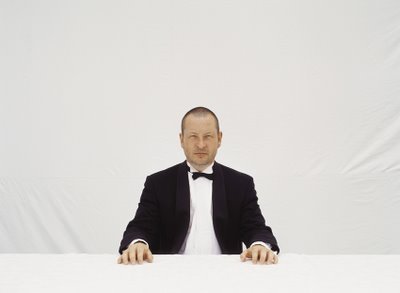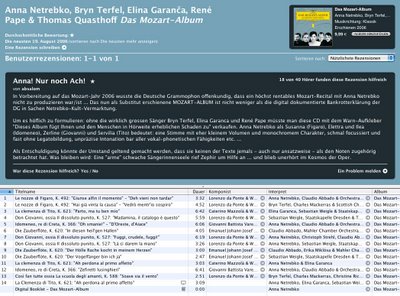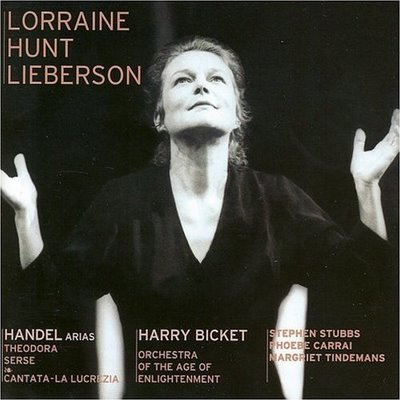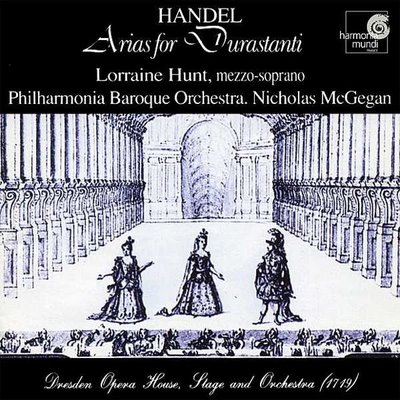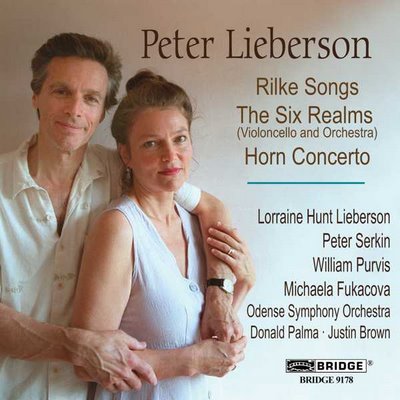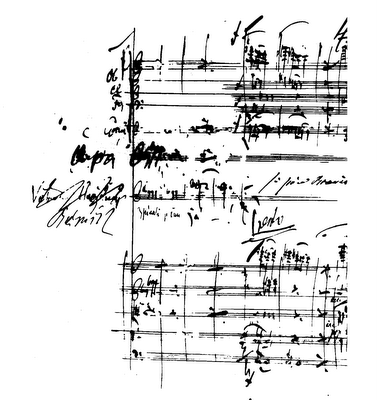Sonntag, 27. August 2006
Sonntag, 20. August 2006
Mittwoch, 16. August 2006
Dienstag, 15. August 2006
Montag, 14. August 2006
LORRAINE HUNT LIEBERSON ✝
Lorraine Hunt Lieberson dies, aged 52
»Lorraine Hunt Lieberson, one of the vocal world’s most beloved mezzo-sopranos, died on July 3 at her home in Santa Fe, New Mexico, at the age of 52. Although she had cancelled the majority of her engagements over the past 18 months, claiming extreme pain in her lower back, Hunt Lieberson had previously suffered from breast cancer several years ago and many observers have speculated about a possible relapse. A spokesman from IMG Artists, in reporting the death to the New York Times, mentioned only ›a long illness‹.
Hunt Lieberson, a former freelance violist, quickly became known for her keen musicianship and emotional transparence, as well as her unorthodox choices in repertory. After moving to Boston, the San Francisco native worked regularly with the Boston-based conductor Craig Smith and director Peter Sellars. Her first high-profile acclaim came in Sellar’s controversial 1985 production of Handel’s Giulio Cesare, where she played Sesto as an armed terrorist.
That production revealed the singer’s future trajectory, specialising in both early music (Mozart was usually as far as she went on the repertory timeline) and contemporary music. She recorded numerous Handel works with Nicholas McGegan and the Philharmonia Baroque Orchestra for Harmonia Mundi and a pair of solo Bach cantatas with Smith for Nonesuch, which had been staged by Sellars for Lincoln Center’s New Visions series. For the opening of Amsterdam’s Muziekgebouw at the 2005 Holland Festival, where she was scheduled to reprise Sellar’s stagings, she appeared only in Cantata No 82, ›Ich habe genug‹, performing its text yearning for death as a terminally ill patient dressed in a hospital gown.
In contemporary music, Hunt Lieberson was featured in John Adams’ oratorio El niño for Nonesuch, and made her Metropolitan Opera debut in John Harbison’s 1999 opera, The Great Gatsby. It was her premiere of Peter Lieberson’s 1997 opera Ashoka’s Dream in Santa Fe, however, that would arguably have the most effect on her life and career. After singing the role of Triraksha, Ashoka’s consort, Hunt and the composer became inseparable. Following Lieberson’s divorce from his then wife, the two were married in 1999.
Hunt Lieberson’s last public performances were the premiere of her husband’s Naruda Songs with the Boston Symphony Orchestra last November in both Boston and New York. She is also featured on a new recording of her husband’s Rilke Songs on Bridge Records. Gramophone, in the current (August) issue, said her performance of her husband’s music ›embod[ies] a spiritual interconnection that comes around all too rarely in the world‹.
Ken Smith, online US Correspondent of GRAMOPHONE, July 5, 2006
La Divina è morta
Lorraine Hunt Lieberson, Mezzo Often Compared to Callas, Has Died at Age 52
By Matthew Westphal
July 5, 2006
She inspired wonderstruck fans and hard-headed critics alike to call her the greatest artist in opera today. Her dramatic intensity and passionate commitment to her material — to a Mahler symphony movement, a Bach cantata or a single Schubert song as much as to a starring role — earned her countless comparisons to Maria Callas, yet her pitch and delivery were nearly as accurate as Emma Kirkby's. She was so un-diva-like that she never hired a press agent.
Mezzo-soprano Lorraine Hunt Lieberson died on July 3 at her home in Santa Fe.
An executive at IMG Artists, speaking on behalf of her husband, composer Peter Lieberson, told The New York Times only that she died »after a long illness.« Bloomberg.com reported the cause of death as cancer; members of the popular online bulletin board Opera-L reported the cause of death as, variously, metastatic liver cancer and a recurrence of the breast cancer with which she was diagnosed in 2000.
By the end of 2001, most observers thought her recovery was complete, and she went on to some of her greatest triumphs. But in January 2005 she began what became a long string of cancellations (the most recent being three weeks ago), often several months in advance; as the withdrawals continued, the stated explanation — a lower back injury — seemed less convincing.
Yet she made a point of keeping dates to perform her husband's music. Her last great success was with Neruda Songs, a cycle to texts by the Chilean poet which he wrote for her. She sang the world premiere with the Los Angeles Philharmonic in May 2005, the East Coast and Midwest premieres with the Boston Symphony and Cleveland Orchestra the following November and December; her performances of the cycle with the Boston Symphony on tour in March of this year were evidently her final public concerts. Praise from audiences and critics alike was as rapturous as ever.
Lorraine Hunt was born (on March 1, 1954) and raised in the San Francisco Bay Area. The child of music teachers, she studied violin as a child but switched to viola at age 12 and sang and played through high school. She studied voice and viola at San Jose State University, supporting herself as a freelance orchestral musician.
According to a 2004 profile in The New Yorker, Hunt had a lounge act after college with her guitarist boyfriend, performing songs ranging from Jerome Kern to Stevie Wonder to Joni Mitchell. When that boyfriend was caught buying marijuana in Mexico and jailed, she moved into the prison with him, joining a group of women who bribed the guards to let them live there with their partners.
In 1979 she was principal violist of the Berkeley Symphony when Kent Nagano became its music director; that year she sang Hansel in a production of Humperdinck's Hänsel und Gretel Nagano conducted at San Quentin Prison in San Francisco Bay.
She moved to Boston in 1980 when a subsequent boyfriend got a position with the Boston Symphony and studied voice at the Boston Conservatory. (The Juilliard School turned her down.) She gave up the viola for good in 1988 after her instrument was stolen from her Boston apartment. (She had let the insurance lapse.) She later told The New Yorker that she took the theft as a sign.
Hunt began her singing career as a lyric soprano. During this period she developed two key professional and personal friendships — with conductor Craig Smith, who directed the extensive music program at Emanuel Church in Boston, and then – enfant terrible stage director Peter Sellars.
Her dramatic gifts first became evident in two Sellars-Smith collaborations for the Pepsico Summerfare festival in Purchase, New York: she was an aggrieved and impetuous teenaged Sesto in Handel's Giulio Cesare (1985), set at the Cairo Hilton, and a drugged, frenzied Donna Elvira in Mozart's Don Giovanni (1987), set in an East Harlem drug den.
Her status as a great Handel singer was firmly established by performances and recordings with conductor Nicholas McGegan in the title roles of Susannah (1989), Theodora (1991) and Ariodante (1995). All three are widely considered to this day to be the finest renditions of the roles on disc.
The performance that made Hunt a bona fide opera star was, improbably enough, in another Baroque opera by a less familiar composer: Marc-Antoine Charpentier's Médée. The production, the second of the legendary collaborations between stage director Jean-Marie Villégier, conductor William Christie and his period-instrument orchestra Les Arts Florissants, was presented in Paris (1993), Brooklyn and Lisbon (1994). She had an equal success with Christie and Villégier in 1996, again in Paris and Brooklyn, as Phèdre in Rameau's Hippolyte et Aricie.
Later notable work with Sellars included a 1996 Glyndebourne Festival staging of Handel's oratorio Theodora (this time in the contralto role of Irene), the premiere of John Adams's oratorio El Niño (2000-01) and a well-traveled staging of two Bach cantatas, first seen in 2001 at Lincoln Center in New York, that polarized audiences on both sides of the Atlantic.
(The Nonesuch CD of those cantatas, on the other hand, received abundant award nominations and won Hunt Lieberson acclaim as far afield as NPR newscasters and Atlanta rock critics.)
Little of this career history is what one would expect for a mezzo hailed as one of the great opera singers of our time. In her professional choices as in her temperament, Lorraine Hunt Lieberson was a most untypical diva.
She never sang with the Royal Opera, La Scala or the Vienna State Opera. Her San Francisco Opera debut was in Monteverdi (Ottavia in L'incoronazione di Poppea), her Opéra de Paris debut in Rameau (Phèdre). Her first appearance at Lyric Opera of Chicago would have been next February — in Poulenc, as Mère Marie in Dialogues des Carmélites.
She performed in only two productions at the Metropolitan Opera: the world premiere of John Harbison's The Great Gatsby (1999), in the secondary role of Myrtle Wilson, and Berlioz's Les Troyens (2003). Her Didon in the latter will likely be remembered as one of the half-dozen greatest performances at the Met in this decade.
And she only sang Carmen twice — the complete role with Boston Lyric Opera in 1994 and Act IV with José Carreras in a Metropolitan Opera »Millennium Gala« in 2000.
She was known to be very choosy about her projects; she preferred festivals such as Aix-en-Provence, Santa Fe and Glyndebourne where collaboration is close and rehearsal plentiful; for similar reasons, at major houses she tended to do new productions and new operas and avoid revivals. She returned again and again to work with trusted colleagues, in particular Sellars, Smith and choreographer Mark Morris. She sang in the world premieres of two of Morris's masterpieces, L'Allegro, il Penseroso ed il Moderato (1988) and Dido and Aeneas (1989); he was to direct her as Gluck's Orfeo at the Met next May.
In contemporary opera, she may be more famous for the roles she missed creating than those she did create. Her health problems caused her to withdraw from two of the highest-profile world premieres of this decade: Kaija Saariaho's L'Amour de loin at the 2000 Salzburg Festival and John Adams's Doctor Atomic at San Francisco Opera in 2005.
One world premiere Hunt did perform proved momentous: She and Peter Lieberson fell in love when she sang in his first opera, Ashoka's Dream, at Santa Fe in 1997. He had a wife at the time; singer and composer were not able to marry until 1999.
A disc of Lorraine Hunt Lieberson singing her husband's Rilke Songs with pianist Peter Serkin was released by Bridge Records in May; a concert recording of Neruda Songs, their final collaboration, will surely appear soon.
A Short Biography of Lorraine Hunt Lieberson
